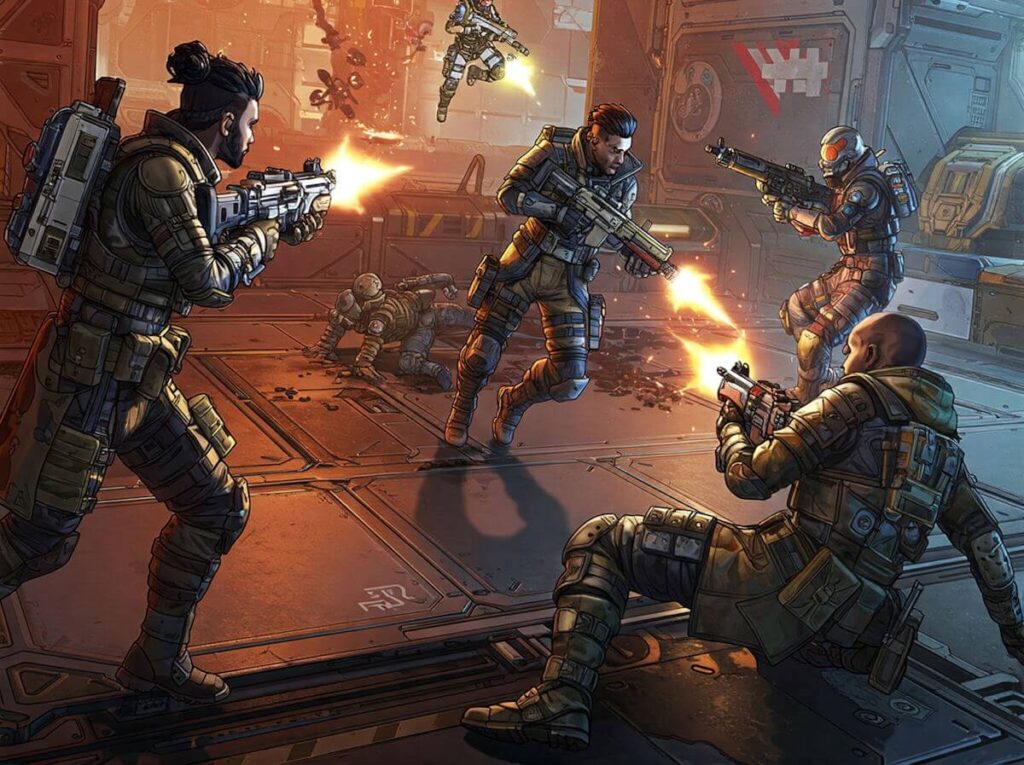Introduction to Battle Royale Games
The battle royale genre, which has become a significant force in the gaming industry, traces its origins to various gameplay mechanisms rooted in earlier formats. The concept of survival games has long fascinated players, with early examples manifesting through titles such as “DayZ” and “H1Z1”. These games emphasized a blend of survival, exploration, and scavenging elements that captivated a growing audience. However, it was the introduction of the “last-player-standing” mechanic that propelled the genre into mainstream success. This mechanic underscores the essence of battle royale games, where players must not only survive against opponents but also contend with an ever-shrinking battlefield that intensifies the competition.
The appeal of battle royale games lies in their unique combination of strategy, teamwork, and competition. Players often begin with little more than the clothes on their backs, scattered across a vast map filled with resources. From weapons to health supplies, scavenging plays an integral role, encouraging interaction and tactical decision-making as players navigate the terrain. This survival aspect cultivates a sense of urgency, pushing players to adapt quickly to their surroundings. Unlike traditional team-based games, which can end in draws or stalemates, the battle royale format guarantees a definitive conclusion to each match, where only one player or team emerges victorious.
The genre’s explosive growth can be attributed to numerous factors, including streaming platforms and the rise of competitive gaming. The accessibility of these games, often available for free, combined with their captivating gameplay, has drawn in millions of players worldwide. Titles like “Fortnite” and “PUBG” have paved the way for subsequent entries, including “Apex Legends”. As we delve deeper into the realm of Apex Legends, it is essential to understand how it not only embraces these core characteristics of battle royale but also innovates within the genre, shaping its future.
The Arrival of Apex Legends
Apex Legends made its grand debut on February 4, 2019, swiftly becoming one of the most talked-about games in the battle royale genre. Developed by Respawn Entertainment, the game was released unexpectedly with minimal pre-launch marketing, which contributed to an air of intrigue and excitement among the gaming community. The absence of a traditional marketing campaign was countered by a clever strategy that capitalized on influencer engagement and a surprise launch, generating a significant amount of word-of-mouth buzz.
One of the primary factors contributing to Apex Legends’ immediate success was its free-to-play model, which lowered the barrier to entry for players worldwide. This accessibility allowed a diverse player base to join the fray without any financial commitment, contrasting with many games in the genre that required upfront purchases. Coupled with its engaging gameplay mechanics, the game’s model effectively encouraged a fast-growing community eager to share their experiences and strategies online.
Apex Legends also introduced innovative gameplay elements that distinguished it from its competitors. The inclusion of unique characters, known as ‘Legends,’ each with their own abilities and roles, fostered a sense of teamwork and strategy that resonated with players. This character-driven approach allowed for diverse gameplay styles and dynamic team compositions. Additionally, the game’s smooth movement mechanics and revitalized ping system enhanced communication, streamlining the coordination between players in a often chaotic environment.
Within weeks of its launch, Apex Legends amassed millions of players, showcasing its capacity to fill a gap in the battle royale market. The game’s popularity was not merely a trend; it signified a pivotal moment for the genre, with Apex Legends leading the charge towards a more collaborative and character-focused multiplayer experience. Its impact on the gaming landscape continues to resonate, inspiring future titles to adopt similar approaches in design and marketing.
Character Classes and Their Impact
Apex Legends has uniquely reshaped the battle royale genre through the introduction of its character class system. Unlike many other titles in this space that merely focus on player survival and skill, Apex Legends offers a diverse ensemble of Legends, each endowed with distinct abilities and roles that significantly influence gameplay dynamics. This strategic element of character selection introduces an additional layer of depth that is often absent in typical battle royale experiences.
Each Legend fits into one of three core classifications: Offensive, Defensive, and Support. This classification not only dictates their abilities but also informs how players approach combat scenarios and team strategies. For instance, offensive Legends like Wraith can engage enemies at a tactical advantage, utilizing their teleportation abilities to flank opponents. In contrast, defensive characters such as Gibraltar provide necessary cover and support for teammates, creating a more balanced team dynamic. Support Legends like Lifeline excel at providing healing and sustenance to keep the team alive longer during intense engagements.
This inclusion of character classes encourages players to collaborate effectively, fostering teamwork and strategic planning. Players must consider their Legend’s strengths and weaknesses in tandem with their teammates’ choices. This necessitates a level of coordination and adaptability that enriches the overall gameplay experience. Moreover, the unique abilities of each Legend can turn the tide of battle, making character choice a critical element in achieving victory. As players learn the synergies between various Legends, they can develop tactics that capitalize on these strengths, showcasing a level of diversity in gameplay that further distinguishes Apex Legends from its competitors in the genre.
Ping System: Enhancing Communication
Apex Legends has integrated a groundbreaking feature known as the ping system, which has significantly transformed the communication dynamics within the battle royale genre. This system allows players to convey vital in-game information without the necessity of voice chat, which can often be a barrier to effective teamwork. Through a series of contextual pings, players can indicate locations of enemies, share loot information, and even suggest strategies, all while maintaining the flow of gameplay. This innovation serves to enhance not only the speed of communication but also its clarity.
The effectiveness of the ping system in Apex Legends lies in its design, which incorporates various types of pings for specific situations. For instance, players can use different pings to alert teammates of enemy positions, direct attention to supply drops, or signal an intent to regroup. Because these pings are easily accessible via a simple button press, players can stay focused on the action, making crucial decisions on the fly. This ultimately fosters a higher level of engagement and teamwork among squad members, regardless of their individual communication abilities.
Moreover, the inclusion of the ping system promotes inclusivity within the gaming community. Many players, including those who are conversant in different languages or those who are hard of hearing, can partake in strategic discussions and collaborative gameplay without feeling isolated. By allowing every player to contribute to the team dynamic, Apex Legends ensures that teamwork can flourish, irrespective of traditional communication barriers. Consequently, the ping system has set a new standard for how players interact in a battle royale setting, inviting a more diverse range of gamers to engage and enjoy the experience together.
Fluid Movement Mechanics
Apex Legends has set a new standard in the battle royale genre through its emphasis on fluid movement mechanics. Unlike many of its competitors, which often adhere to more traditional movement styles, Apex Legends incorporates advanced techniques such as sliding, climbing, and zip line usage. These features not only enhance the speed of gameplay but also introduce a layer of strategy that enriches the overall player experience.
The sliding mechanic allows players to maintain momentum while traversing the environment. By initiating a slide, players can quickly dodge incoming fire or navigate through tight spaces with grace. This mechanic encourages an aggressive playstyle, rewarding players who master the timing and execution of their slides. Moreover, the combination of sprinting into a slide enables players to cover greater distances rapidly, making it integral for both escaping danger and engaging opponents in combat.
Climbing surfaces serves as an additional movement tool that encourages verticality in gameplay. This ability enables players to navigate complex terrains and gain advantageous high ground over their adversaries. The climbing system in Apex Legends isn’t just an aesthetic feature; it directly influences how players approach combat. By utilizing vantage points, they can assess the battlefield and position themselves strategically for assaults, creating opportunities for flanking or ambushing enemies.
The presence of zip lines further enhances the movement dynamics of Apex Legends. These allows for rapid traversal across maps, connecting different areas and facilitating quick escapes or repositioning during engagements. This mechanic not only contributes to faster-paced gameplay but also bolsters team dynamics, as coordinated use of zip lines can lead to successful flanking strategies and surprise attacks on opponents.
In conclusion, the fluid movement mechanics in Apex Legends play a critical role in defining the game’s identity within the battle royale genre. By prioritizing speed and strategic maneuvering, these mechanics significantly elevate player engagement and set Apex Legends apart from more traditional offerings in the market.
Influence of FPS Elements in Battle Royale
The incorporation of first-person shooter (FPS) elements into the battle royale format of Apex Legends has significantly altered the landscape of the genre, enhancing player engagement and overall satisfaction. Apex Legends emphasizes fluid gunplay mechanics, which constitute one of its most compelling features. Unlike many traditional battle royale games, the title has introduced a level of precision and responsiveness that allows players to engage in combat with a greater sense of control and skill. The seamless transition between aiming down sights, sprinting, and executing melee attacks creates a dynamic combat experience that feels both exhilarating and rewarding.
Weapon customization is another essential facet of the FPS integration in Apex Legends. Players can find various attachments throughout the game, including scopes, stocks, and barrel stabilizers, which significantly influence gun performance. This customization encourages players to adapt their strategies and playstyles based on the weapons they select, as well as the available modifications. Such flexibility addresses different player preferences and skill levels, ultimately contributing to a richer gameplay experience that caters to diverse audiences. The ability to optimize weapon handling and accuracy fosters a deeper level of engagement, as players can fine-tune their arsenals to maximize effectiveness in combat.
Furthermore, the game’s focus on strategic squad-based gameplay enhances the FPS mechanics by necessitating teamwork and communication among players. Each character’s unique abilities, combined with gunplay, demand coordination and tactical planning. The incorporation of these elements not only distinguishes Apex Legends from other titles within the genre but also cultivates a rewarding environment where players feel their contributions matter during confrontations. As a result, the FPS elements present in Apex Legends play a crucial role in redefining player interactions, making the combat more immersive and intensifying the overall battle royale experience.
Seasonal Updates and Evolving Gameplay
Apex Legends has significantly transformed the battle royale landscape through its unique approach to seasonal updates. Rather than delivering sporadic content, the developers at Respawn Entertainment have embraced a structured seasonal model, ensuring that the game continuously evolves and maintains player engagement. Each new season introduces a plethora of fresh content, including new Legends, maps, and gameplay modes that not only enhance gameplay but also keep the community actively involved.
The introduction of new Legends with each season is pivotal to the gameplay experience. Each character comes equipped with distinctive abilities that can significantly alter strategies and team compositions. This feature encourages players to experiment with different combinations and tactics, breathing new life into the gameplay mechanics. By adding new characters regularly, Apex Legends fosters a dynamic environment where seasoned players can face fresh challenges while new players have an ever-expanding roster to explore.
Additionally, seasonal updates often involve map alterations or new locations, which refresh the visual and tactical landscape of the game. These map changes can include the introduction of diverse terrains, new points of interest, or even entirely new maps that players can explore. Such enhancements allow for varied experiences within the same game framework, promoting a sense of novelty and excitement with each season’s release.
Furthermore, Apex Legends integrates new gameplay modes, catering to various player preferences and playstyles. Whether it’s a limited-time event or a permanent game mode, these additions diversify the player experience and create opportunities for unique challenges. This seasonal approach not only sustains player interest but also serves to draw back those who may have taken a break from the game, illustrating how Apex Legends continues to lead the charge in redefining the battle royale genre through its evolving gameplay.
Community Engagement and Competitive Scene
Since its release in February 2019, Apex Legends has not only captivated players with its gameplay but has also fostered a strong community through various engagement strategies. Respawn Entertainment has actively implemented measures to cultivate a sense of belonging among players, ensuring that they feel heard and valued. One significant approach to community engagement is the introduction of events and tournaments that bring players together and encourage competition. These organized events span from casual in-game competitions to more structured tournaments featuring professional teams. Such initiatives have progressively contributed to a thriving competitive atmosphere.
The Apex Legends Global Series (ALGS), for instance, epitomizes Respawn’s dedication to building a competitive landscape. This series showcases top-tier gameplay and draws players from diverse backgrounds, fueling rivalries that heighten the excitement inherent in the battle royale genre. With regular updates and changes based on player feedback, Respawn maintains an adaptive environment that reflects the desires and needs of the community. Furthermore, the developers utilize forums, social media platforms, and in-game surveys to gather insights, which they subsequently incorporate into game enhancements. This exchange has proven beneficial in refining game mechanics and addressing player concerns, solidifying trust between the developers and the player base.
The establishment of a vibrant esports scene is another testament to Apex Legends’ influence on the battle royale genre. By showcasing competitive gameplay through streams and tournaments, Respawn has elevated the prestige of professional gaming. The viewing experience is enriched by the diversity of characters and strategies available in Apex Legends, offering spectators an engaging spectacle. As a result, not only do players engage deeply with the game, but they also invest in its competitive future, ensuring sustainability and ongoing community involvement.
Conclusion: Legacy of Apex Legends in the Genre
Apex Legends has undeniably made a significant impact on the battle royale genre since its unexpected release in February 2019. Through its innovative features, such as the unique character abilities, the ping system, and a fast-paced yet strategic gameplay approach, the game has redefined player expectations. The emphasis on teamwork and communication has fostered a more cooperative environment, distinguishing Apex Legends from its competitors. This focus on player-centric design not only elevated gameplay experience but also set a new standard for interactive elements within the genre.
The integration of distinct character classes allowed for a diverse roster of Legends that catered to various play styles, encouraging players to explore different approaches in each match. This diversity facilitated an environment that rewarded tactical decision-making and adaptability, drawing in both casual gamers and competitive players alike. As creators of the battle royale genre continue to evolve, the lessons learned from Apex Legends will be invaluable in shaping future titles, emphasizing the importance of player engagement, character agency, and community-building.
Looking ahead, the legacy of Apex Legends suggests a promising trajectory for the battle royale genre. As the gaming community continues to demand innovation and creativity, developers are likely to experiment with new mechanics and concepts inspired by the successes of Apex Legends. This ongoing evolution may lead to more hybrid genres blending elements from role-playing, strategy, and multiplayer formats, creating fresh experiences for players.
Ultimately, Apex Legends has not only influenced the current landscape of battle royale games but also paved the way for future developments. Its revolutionary contributions will resonate for years to come, ensuring that its legacy is felt long after the game’s peak. The adaptability showcased in Apex Legends serves as a reminder that, in this dynamic genre, evolution is key to sustaining player interest and fostering a vibrant gaming community.




